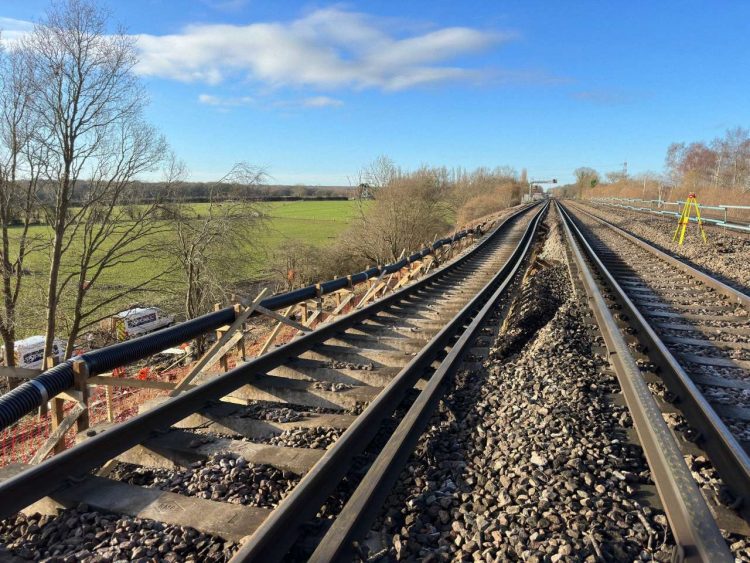This weekend, 21st/22nd January, the railway line at Hook in Hampshire, where there was an enormous landslip a week ago, is being remodelled to allow a better train service to operate while long-term repairs are carried out.
Last Saturday, 14th January, the landslip occurred on an embankment to the northeast of Hook station. As a result, two tracks of the four-track railway became unusable and only two of the tracks could be used by trains. However, the line was designed so that both those tracks were for use by London-bound trains only.

This weekend, all train services will be suspended as Network Rail will close the railway between Basingstoke and Woking to allow engineers to reconfigure the track layout and bypass the landslip.
The landslip is in a remote location, and to enable engineers to get materials and machinery to the site they needed to build a 580-metre-long access road across fields.
To repair the landslip, engineers will construct a retaining wall 60-metres long comprising nearly one hundred 12-metre long ‘sheet piles'. These will be driven into the ground to stabilise the embankment and protect the railway from future landslips. At the same time, the steepness of the embankment slope will be reduced to minimise the risk of material falling away in the future.
Network Rail Wessex Route Director Mark Killick said: “We're going to move the track onto a stable section of the embankment so that we can have a line running in each direction.
“While it's a very unusual approach to change the track layout, it means we can run more trains and give customers a much better experience while we fix the embankment.
“The only downside is that we will need to close the railway again once the embankment is repaired to restore the track layout to its original position, but it gives the least disruptive solution for our customers.
“In the meantime, we will be able to continue the embankment repairs, while running a significantly improved train service. We'll have hundreds of engineers working round the clock, but we still expect the fix to take a number of weeks, as it's a very complex engineering project.
“We'll update customers with a more definitive timescale to reopen all four lines as soon as we can.”
Working with our colleagues at South Western Railway, after this weekend's works, we will be able to offer a significantly improved service which will restore crucial transport links that have been cut off since the weekend.
“It also means trains can serve all stations again, with the exception of Hook station where trains travelling towards Basingstoke will not be able to stop due to the position of the landslip.”
“I'd like to say how sorry I am for the disruption our customers are facing. We're working round the clock to fix the railway as quickly and safely as possible.
“Thank you in advance to the people who live nearby while we carry out the repairs. They've been very understanding and supportive.”
Claire Mann, South Western Railway's managing director, said: “We are very sorry for the ongoing disruption due to the landslip at Hook on Saturday 14, which has meant a severely reduced service on one of the country's busiest railway lines.
“We know how frustrating this week has been for our customers, particularly those in the Hook, Winchfield, and Fleet areas, with trains unable to stop at these stations.
“Our colleagues at Network Rail are working around the clock and their work over the weekend means we will be able to reinstate direct services from London to Exeter and Weymouth on Monday 23, albeit with a reduced frequency.
“Until these initial works by Network Rail are completed, we must urge customers to only travel if absolutely necessary between Basingstoke and Woking. We would like to thank customers for their patience and understanding.”
In recent years the effects of climate change have accelerated. Rain events that happened over days, now happens in hours. The drainage system can’t cope.
Why can’t we utilise this rainfall to augment drinking water supply caused by dryer summers?
What could be done if the railways were more flexible is to run fast services from Basingstoke to Paddington via Reading. That would only take about 55 minutes. Thanks to platforms A and B for the Elizabeth Line, Paddington has the platform capacity. SWT has the fleet of class 159 trains so Exeter-London trains could be routed that way. There would be the problem of crews and route knowledge to overcome and that’s where the inflexibility of the current structure and frankly unwillingness to put in the undoubtedly great effort needed are barriers to providing alternative good services when serious blockages occur.
An aggressive approach to cutting trees off embankments will course erosion, which we all know make land less stable with no tree roots holding the soil together.
Ok, you get leaves on the line instead with leaving trees in place.